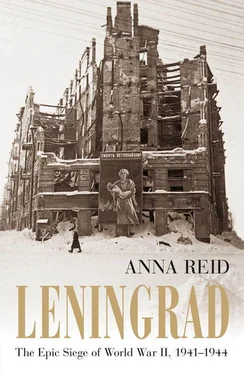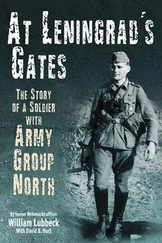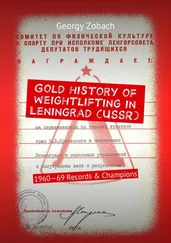Closer to reality was a cynical joke of the time. A Red Army lieutenant is found sitting in an abandoned German lorry. He is told to move because otherwise he will get fired at. ‘Who by?’ he retorts. ‘The Germans will think it’s theirs, and our lot will run away.’ {35} 35 Beevor and Vinogradova, eds, A Writer at War , p. 41.
Throughout the war’s first weeks, the Northwestern Army Group remained in near-total disarray. Internal reports repeatedly describe units as retreating ‘as individuals and in small groups’, a euphemism for complete disorder. Cut off by the German advance, large numbers of soldiers wandered the devastated countryside, trying either to return to Soviet lines or to surrender to the enemy. Leaflet drops told them to consider themselves partisans, and encouraged them with news of the new Soviet—British alliance. {36} 36 RGASPI: Fond 77, op. 4, delo 48, pp. 11–20.
So many were taken prisoner that the Germans simply herded them into the nearest available secure buildings, without any provision for food, sanitation or clean water. Men who did manage to rejoin their units were accused of cowardice, desertion or spying. Though the Red Army knew the terrain, its attempts at counter-attack were conducted, according to Halder, ‘in a manner which plainly shows that their command is completely confused. Also, the tactics employed in these attacks is singularly poor. Riflemen on trucks drive abreast with tanks against our firing line, and the inevitable result is very heavy losses to the enemy.’ By 3 July, Halder estimated, twelve to fifteen of the Northwestern Army Group’s twenty-one infantry and armoured divisions had been wiped out. {37} 37 Charles Burdick and Hans-Adolf Jacobsen, eds, Franz Halder, The Halder War Diary, 1939–1942 , pp. 445–6, 3 July 1941.
The confusion was intensified by a deadly round of scapegoating within the Soviet High Command. The most prominent victim was General Dmitri Pavlov, commander of the Western Army Group, who was arrested on 4 July and executed on the 22nd, together with three of his subordinates. General Kopets, head of Soviet bomber command, saved the NKVD the trouble by committing suicide on the second day of the war. Further down the line uncounted numbers of officers were shot on the spot by military tribunals, for ‘cowardice’ in making unauthorised retreats. {38} 38 Simon Sebag Montefiore, Stalin: The Court of the Red Tsar , p. 328; Richard Overy, Russia’s War , p. 81; Salisbury, The 900 Days , p. 105.
From Moscow General Zhukov urged on the bloodletting. ‘Commanders who retreat from defence lines without orders, treacherously squandering their positions’, a telegram of 10 July thundered, ‘have been going unpunished. Nor do your destruction battalions [of NKVD troops, responsible for rounding up deserters] yet seem to be operating; they have produced no visible results.’ Representatives of the Military Council and military prosecutor were to ‘quickly drive out to the forward units and deal with cowards and traitors on the spot’. {39} 39 TsAMO: Fond 96a, op. 1711, delo 24, pp. 24–5. Also quoted by Glantz, The Battle for Leningrad , pp. 42–3.
Hence the abject tone of many reports from the front, which typically insist that units have fought to their ‘last round’ before being forced to retreat. {40} 40 See for example the 9th Pskov NKVD Border Detachment on 3 July 1941. RGVA: Fond 32904, op. 1, delo 79, p. 88.
Significant for Leningrad was the fate of Kirill Meretskov, the burly, snub-nosed forty-four-year-old general who had commanded the disastrous first stages of the war against Finland and briefly been promoted to chief of staff, before losing the post to Zhukov. He was arrested in the first days of the war, having been named by his friend Pavlov as a member of a fictitious anti-Soviet conspiracy. In prison he was beaten with rubber rods by one of NKVD chief Lavrenty Beria’s senior deputies—another former friend—before being recalled to duty in September. Cleaned up and in full uniform, he was affably greeted by his torturer on his way to Stalin’s office. Bravely, he refused to act the amnesiac: ‘We used to meet informally’, he told the man, ‘but I’m afraid of you now.’ Having enquired after his health and kindly allowed him to sit, Stalin told him that he had been appointed Stavka’s (High Command’s) representative to the Northwestern Army Group. Understandably reluctant, following this experience, to take the initiative or question orders, Meretskov was one of the Army Group’s two or three most senior commanders for the whole of the rest of the war. {41} 41 Sebag Montefiore, Stalin , p. 338; Geoffrey Jukes in Harold Shukman, ed., Stalin’s Generals , p. 129.
Along with the bloodletting came a reshuffle of senior military appointments. Leningrad was unlucky in being assigned to Marshal Kliment Voroshilov. Sixty years old, vain and dapper, with a pencil moustache and small, pale blue eyes, he is often portrayed as a gallant but bumbling old warhorse (not least by Harrison Salisbury, who repeats the story that he personally led a group of marines—‘their blond hair tousled in the wind, their faces fresh, their chins grim’—in a bayonet charge outside Krasnoye Selo in September. Perhaps he did.) He was in fact not only militarily incompetent—as defence commissar he had presided over the disastrous opening stages of the Winter War—but, like Zhdanov, a desk-bound mass murderer, organiser of the purges that had wiped out most of the senior Red Army officer corps only four years before. Dmitri Volkogonov, in charge of the Soviet army’s political education section before he became the first important glasnost -era biographer of Stalin, is eloquent: ‘Mediocre, faceless, intellectually dim’, Voroshilov was ‘nothing more than an executioner, a henchman of the Executioner-in-Chief.’ {42} 42 Shukman, ed., Stalin’s Generals , pp. 313, 320. General Alan Brooke, Britain’s Chief of Imperial General Staff, sat next to Voroshilov at dinner during the Moscow Conference of August 1942. He reckoned him ‘a fine hearty old soul, willing to talk about anything with great vivacity’, but with the military expertise of a ‘child’.
Voroshilov’s second-in-command, Marshal Grigori Kulik, was no better. Another old Civil War cavalryman and a crony of the sadistic Beria, he was a bullying, ignorant drunkard, whose incompetent direction of the 54th Army to Leningrad’s south was largely to blame for the city’s encirclement. Soldiers nicknamed his leadership style ‘Prison or a Medal’—if a subordinate pleased him he got an award, if not he was arrested. {43} 43 Salisbury, The 900 Days , pp. 112, 282, 322, 404. See also Evan Mawdsley, Thunder in the East: The Nazi-Soviet War 1941–1945 , p. 450.
While Stalin wiped out yet more of his top brass, Hitler and his staff, now headquartered in the specially built ‘Wolf’s Lair’ outside Rastenburg in East Prussia, exulted. Hitler’s after-dinner musings reached new heights. ‘The beauties of the Crimea’, he opined between midnight and 2 a.m. on the night Army Group North captured Riga, ‘will be made accessible by means of an autobahn. The peninsula will be our German Riviera. Croatia will be another tourism paradise for us.’ Russia’s twin capitals apparently failed to offer the same leisure potential: three days later, as Pskov was taken, Hitler called Halder to a meeting and told him that it was ‘his firm decision to level Moscow and Leningrad, and make them uninhabitable, so as to relieve ourselves of the necessity of feeding their populations through the winter. The cities will be razed by the air force.’ So confident was he that the whole of European Russia was about to fall into his hands that he instructed Halder to start planning operations against the industrial cities of the Urals. Even cautious Halder admitted to his diary that things were evolving ‘gratifyingly according to plan’. Barbarossa’s initial objective—to shatter the bulk of the Red Army west of the rivers Dvina and Dnieper—had, he thought, been more or less accomplished. Though much remained to be done it was ‘probably no overstatement to say that the Russian campaign has been won in the space of two weeks’. {44} 44 Burdick and Jacobsen, eds, Franz Halder, The Halder War Diary , pp. 458–9, 446–7.
Читать дальше











